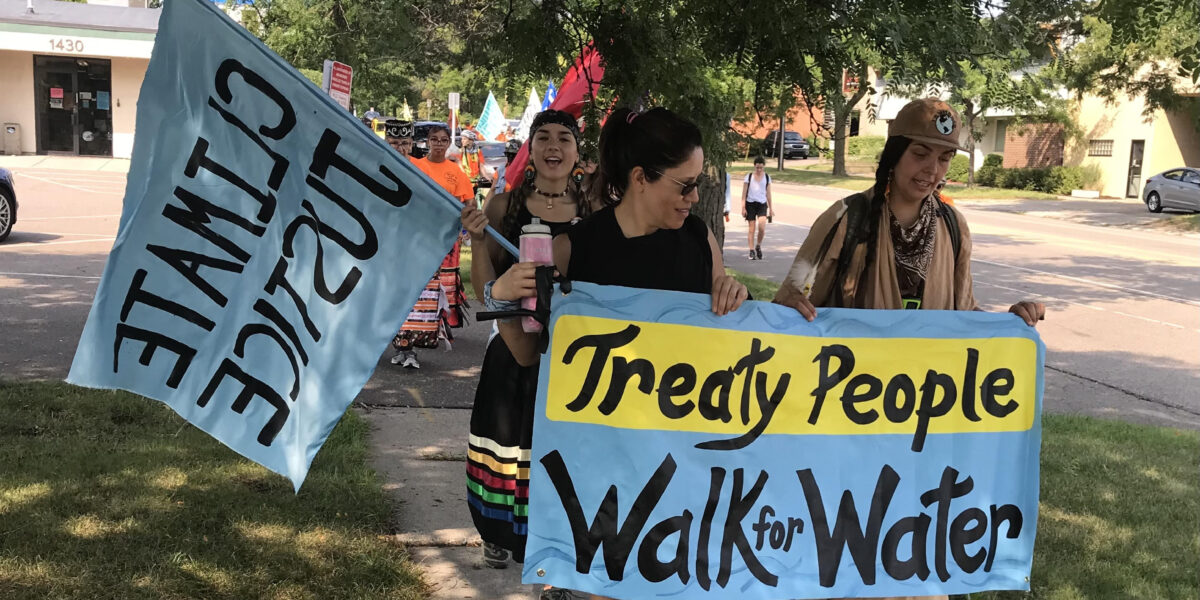This week on Minnesota Native News, the Line Three protest comes to the capitol and – New Native Theater takes its new show to the street. I’m Marie Rock.
If you drove past the state capitol this week, you saw lots of state patrol – and you couldn’t miss the teepees occupying capitol grounds.
Enbridge’s Line 3 is almost complete, yet, if anything, opposition to it keeps mounting. This week indigenous-led environmental groups held ceremonies of prayer and protest at the state capitol.
One of the organizers is Simone Senogles, a Red Laker with The Indigenous Environmental Network.
“It’s crazy to embrace a fossil fuel project of this magnitude, you know, the largest fossil fuel project that this company Enbridge has ever undertaken, in the time when really, we should be phasing out fossil fuels. And I think that we’re at this kind of moment in time where we have to make the decision for life or for death. And the fossil fuel industry needs to go and I feel like it’s on its last legs. But just like an abuser who finally knows it’s their time to go, you know, that’s when they’re the most dangerous,” said Senogles.
Another organizer is a new coalition called including RISE – Resilient Indigenous Sisters Engaging. Dawn Goodwin from White Earth is a founding member of RISE. She’s been a water protector since she was a young girl.
“I went to my dad and said, Dad, what are we going to do if the water gets poisoned? And he said, Don’t worry, my girl. There’s the Clean Water Act. So I just went forward-thinking, yep, it’s going to be protected,” said Goodwin.
Goodwin lives on Lower Rice Lake in Clearwater County, which officials say is experiencing exceptional drought this summer. Goodwin says the lake is so dry it looks like a field.
In her experience, The Clean Water Act has not been enough. State regulation has not been enough. And that all goes back to treaty rights that were supposedly enshrined in the U.S. Constitution.
“One of my grandma’s said that these treaties have been ignored for so long, that people think it’s okay. But it’s not. It’s not okay,” said Goodwin. “Because if we can be honored, and have our treaties upheld, we can have a say about how things go forward. So that we can protect all that we have left, the little bit of natural environment that we have left.”
Goodwin and the others are here to make a stand. Against the new pipeline. In favor of a more sustainable path.
Also this week – New Native Theater is getting ready to perform for a live audience. It will be the first time since the pandemic, and performances will be outdoors. Diego Luke reports:
New Native Theater has been practicing over Zoom most of the summer, but now actors directors and crew are rehearsing in person at the Gremlin Theater in Saint Paul.
The play is called The Unplugging, based on the bestselling book “Two Old Women” by Alabascan author Velma Wallis, who lives near Fairbanks Alaska.
The Unplugging takes place after the apocalypse. Two old women are exiled from their village but learn to survive by traditional ways. Then they meet a stranger from the village that rejected them.
“It’s sadly still as relevant as it was when I wrote it 10 years ago, when I was worried about what happens if the lights go out,” said playwright Yvette Nolan from the Gitigan Zibi Algonquin First Nation, “And so they have to make a decision about whether they want to be part of a society. So the scene you saw, the scene that we were that we were doing when you guys arrived was about the arrival of the outside world to their life.
Actor Christina Woods from the Bois Forte Band, plays one of the old women.
“There’s a number of moments in the play that choke me up. One is when we’re talking about community, and when we think about the historical impact of government, on our tribal communities, it’s, it’s rough, it’s hard,” said Woods.
Christina Woods is a first-time actor, but she has long experience in the arts. She is executive director of the Duluth Art Institute.
“I’m the first Anishinabe to be in this leadership role. And it makes a really big difference to come in with a lens that can see the absent narratives.
Telling those missing stories is the purpose of New Native Theater, which is one of just a handful of indigenous-led theater companies in North America,” said Woods
“The main impact is having people that look like us on stage, and you’ll see a lot of people in the audience who look like us on stage. Another impact is having space to really enjoy our unique native humor that you’re not going to get in other places,” said Woods.
Unplugging tickets are pay-what-you-can, with a suggested donation of $35. The play will be performed at the former Migizi Communications & Gandhi Mahal Site 27th Ave South and Lake Street at 2pm from Sept 2 through Sept. 19.
For more information visit newnativetheatre.org.
Laurie Stern reporting for Minnesota Native News
Subscribe to Minnesota Native News in your favorite podcast app
- The Sugarbush Tradition Continues in Minnesota’s Urban Areas, and Khayman Goodsky’s New FilmANCHOR Marie Rock: This is Minnesota Native News, I’m Marie Rock. This week, we hear about Minnesotans continuing the old tradition of sugarbush in urban areas. Plus, a look at …
- Sherburne National Wildlife Refuge Faces Staffing Cuts; Headlines Affecting Indigenous MinnesotansANCHOR Marie Rock: This is Minnesota Native News, I’m Marie Rock. This week, we hear about the impact of recent federal staffing cuts on Zimmerman, Minnesota’s Sherburne National Wildlife Refuge. …


 Vaccines Remain Top Priority for Tribes and State
Vaccines Remain Top Priority for Tribes and State